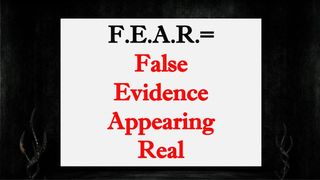Fear
The Solution to Fear-Based Violence is Faith
It worked for the "Son of Sam" serial killer.
Posted March 19, 2018

Is there anything more commonplace or pervasive in this world than violence? Throughout history the answer seems to be a resounding "no." And the anxious, divisive and hate-filled times in which we currently live further confirm that conclusion.
As a criminologist, I am interested in the causes and correlates of violence in all of its various forms. Extensive research has shown that certain human emotions are highly associated with violent crime. Contemporary research reveals that the emotion most likely to lead to violence is anger. In fact, anger or rage is associated with a wide variety of violent acts, including homicide, aggravated assault, rape, domestic violence, child abuse, bullying, torture, and even terrorism.
Consider the relationship between murder and anger. There are many more killings committed spontaneously and in anger (known as voluntary manslaughter) than those committed with premeditation and after careful deliberation. The relationship between anger and violence makes perfect sense when you consider that anger, particularly when it escalates into rage, is an active emotion fueled by adrenaline. Anger demands action, and violence provides a cathartic release or response to the adrenaline fueled demands of anger.
The criminal perpetrator who strikes out in blind rage is often unable to explain his own violent behavior after the fact. Such acts of violence committed in a blind rage are often referred to as crimes of passion. In this regard, think of anger as an intoxicant like alcohol that alters the mental state of a person and drives him to commit a terrible act that he would not do under normal circumstances.
However, based on my experiences as a criminologist, I have concluded that anger is not a primary emotion. Anger is a secondary emotion or a reaction to something else. I believe that fear is actually the root cause of anger.
I have interviewed some very violent criminals and my candid conversations with these individuals have taught me that their violence as adults is often a response to fear and resentment that were not resolved in childhood. In fact, the most violent adults I have ever met are those who have tremendous underlying fears of rejection, inadequacy, failure and abandonment.
Their violence as adults is a childlike response to a frightening world that they believe has been unjust or unfair to them and is therefore deserving of punishment.
Think of the man who kills his spouse or lover in a jealous rage—that is, a crime of passion. In such a case, the rage the man acts upon is rooted in his fear of rejection, abandonment and resentment for the betrayal of his lover.
A powerful example of homicide driven by rage and underlying fear is the case of David Berkowitz, the infamous Son of Sam serial killer. I had the opportunity to correspond with and interview Berkowitz a few years ago and he described profound childhood feelings of inadequacy and fear combined with tremendous resentment when he learned that his biological mother had abandoned him, and his adoptive parents had lied to him about it.
Although most people would not become serial killers based on his childhood experiences, I contend that the Son of Sam emerged and went on a killing spree of epic proportions in New York City in 1976 because David Berkowitz was a lost, frightened, insecure and angry little boy who never grew up or overcame his feeling of inadequacy.
My research has led me to another significant conclusion. That is, faith in something, and positive action based on that faith, are the antidote to fear. Stated differently, if fear is the root cause of all violent crime, then faith and positive action are the solution to fear-based violence. Although this proclamation may rankle some readers, it is, nevertheless, what I have observed among many formerly violent individuals, who are no longer violent, and have overcome their fear and anger through life-altering faith.
My research suggests that the requisite healing faith required to overcome fear need not be in God or organized religion. On the contrary, what seems to be most important in overcoming fear and anger is developing a faith in something outside of and greater than oneself, whatever that may be, and then taking positive, selfless action to help others based on one’s faith.
I have seen formerly frightened and angry men who have found peace by developing a faith in something greater than themselves—whether it be the limitless powers of the universe or the matchless beauty of nature—and exercising their faith in selfless acts of service to others.
My observations have made me wonder: Could it be that a need to believe in some divine principle or a power greater than oneself is an inherent human trait? This is a question better answered by a theologian but I can say this: I have witnessed the transformative effects of faith on the most unlikely, and previously violent, convicted criminals.
For example, the former Son of Sam serial killer, David Berkowitz, became a born-again Christian after having a self-proclaimed spiritual awakening one night in his prison cell at Sullivan Correctional Facility in Fallsburg, NY, in 1987.
Berkowitz now calls himself the “Son of Hope.” He believes that God has forgiven him for his crimes and claims to have been transformed through faith. He believes that his redemption has come at a price, however. Berkowitz told me personally that God saved him so that he could provide help and service to others in prison, to the best of his ability, for the remainder of his time on Earth.
Since his alleged Christian rebirth, he has worked with fellow prison inmates that are physically or mentally challenged, as a peer mentor, spiritual adviser and friend. Most days, he works as a mobility guide, helping physically disabled inmates get around and assists mentally ill inmates who may need a hand with daily activities or those who have difficulty reading or writing.
I am often asked if I believe that Berkowitz has been spiritually transformed as he claims. I can say with confidence that he believes it. In other words, he is not faking his belief.
In person, Berkowitz demonstrates great remorse for his formerly evil ways. He wept openly in my presence while discussing his crimes and the harm he has done. He says he would do anything to undue his terrible deeds but recognizes he cannot, and he also understands that he deserves his punishment.
Incredibly, Berkowitz says that his faith in God and his service to others have given him a sense of purpose, peace and contentment that he sought unsuccessfully throughout his troubled and frightened youth.
I have witnessed the healing powers of faith and service in other formerly violent criminals, too. Although the others are less notorious than the Son of Sam, they were no less troubled, frightened or broken prior to their own spiritual awakenings. Much like Berkowitz, ever since finding faith in a power greater than themselves, they are no longer full of rage or prone to violence.
To say that violence is rooted in fear and anger is not to mitigate the culpability of any violent criminal, regardless of his troubled emotional makeup. On the contrary, we are all accountable for our actions despite our inner turmoil.
However, my research has led me to believe that there is a solution to fear-based violence, and that it is faith in a higher power, combined with selfless service to others. It seems to me that fear and faith are mutually exclusive states of being that cannot coexist in oneself. In my experience, faith trumps fear every time.
Separately, I examine the public’s intense fascination with notorious serial killers, including David Berkowitz (“Son of Sam”) and Dennis Rader (“Bind, Torture, Kill”) with whom I personally corresponded, in my best-selling book Why We Love Serial Killers: The Curious Appeal of the World’s Most Savage Murderers.
Dr. Scott Bonn is an author, professor, public speaker and media commentator. Follow him @DocBonn on Twitter and visit his website DocBonn.com




